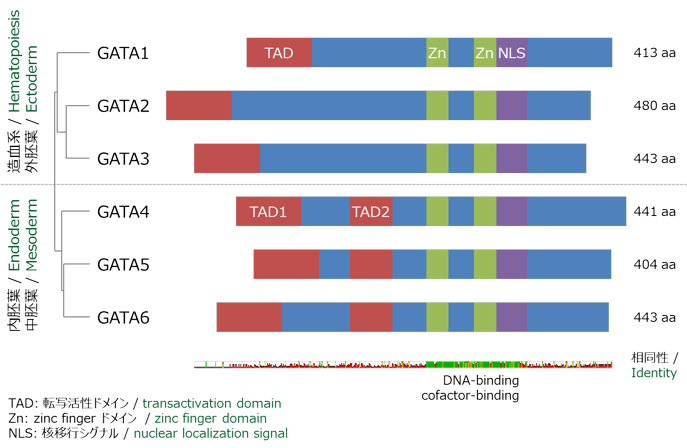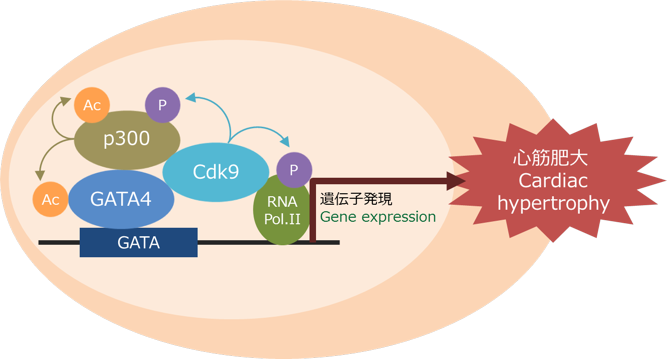目次 / Index
本研究は、長谷川浩二先生 (国立病院機構京都医療センター)、森本達也先生 (静岡県立大学薬学部) との共同研究です。
This study is the collaboration with Dr Koji Hasegawa (National Hospital Organization Kyoto Medical Center) and Dr Tatsuya Morimoto (School of Pharmaceutical Sciences, University of Shizuoka).
GATA 転写因子 / GATA transcription factors
GATA 因子は、プロモーター領域にある GATA 配列 (WGATAR) に結合して遺伝子の発現を制御する、zinc finger 型の転写因子です。脊椎動物には GATA1 から GATA6 の、6つの相同遺伝子が存在します。胚発生において、GATA1-3 は主に造血幹細胞の増殖と分化に関わり、GATA4-6 は内胚葉・中胚葉の分化に寄与します。GATA 転写因子は、成体においても様々な組織で発現する、恒常性の維持に必須の遺伝子群です。
GATA transcription factors are zinc finger proteins which bind to GATA motifs (WGATAR) in promoter regions to regulate gene expression. Vertebrates have 6 homologous genes, GATA1-6. During embryo genesis, GATA1-3 are mainly involved in growth and differentiation of hematopoietic stem cells, and GATA4-6 contribute to endodermal and mesodermal differentiation. Also in adults, GATA transcription factors are expressed in multiple tissues and are indispensable to maintain homeostasis.

Fig 1. GATA 因子の配列比較 / Alignment of GATA factors
GATA4 のアセチル化 / Acetylation of GATA4
ヒストンアセチル化酵素である p300 や CBP は、GATA1 (Boyes 1998)、GATA2 (Hayakawa 2004)、GATA3 (Yamagata 2000) をアセチル化することで活性化します。近年の研究で、p300 は GATA4 もアセチル化することがわかってきました。p300 は GATA4 を直接アセチル化することで、GATA4 の DNA 結合能と転写活性を亢進し (Yanazume 2003)、その結果、心不全を増悪させます (Miyamoto 2006)。ウコンの成分クルクミンで p300 を阻害すると、GATA4 のアセチル化が抑制され、心不全の進展が抑えられます (Morimoto 2008)。したがって、アセチル化 GATA4 の特異的な阻害物質は、強力な心不全治療薬となることが期待されます。私たちは、p300 によってアセチル化される GATA4 のリジン残基 (K311, K318, K320, K322) を同定しました (Takaya 2008)。GATA4 と DNA の結合に不可欠なこれらのリジン残基は、創薬の標的になると考えられます。
Histone acetyltransferases, p300 and CBP, acetylate and activate GATA1 (Boyes 1998), GATA2 (Hayakawa 2004), and GATA3 (Yamagata 2000). Recent studies have revealed that p300 also acetylates GATA4. p300 directly acetylates GATA4 to improve its DNA-binding and transcriptional activities (Yanazume 2003). As a result, p300-induced acetylation of GATA4 deteriorates heart failure (Miyamoto 2006). Curcumin, a polyphenol from turmeric, inhibits p300 activity, suppresses acetylation of GATA4, and prevents development of heart failure (Morimoto 2008). Thus, a specific inhibitor for acetylated GATA4 is expected to be a powerful drug for heart failure. We identified the p300-targeted acetylated lysines in GATA4 (K311, K318, K320, K322), which are essential for the interaction between GATA4 and DNA (Takaya 2008). We are considering these lysines as pharmacological targets.

Fig 2. 心筋肥大における GATA4 のアセチル化 / Acetylation of GATA4 during cardiac hypertrophy
(Ac, アセチル化 / acetylation. P, リン酸化 / phosphorylation)
参考文献 / References
Boyes J, Byfield P, Nakatani Y, Ogryzko V. Regulation of activity of the transcription factor GATA-1 by acetylation. Nature. 1998; 396: 594-598.
Hayakawa F, Towatari M, Ozawa Y, Tomita A, Privalsky ML, Saito H. Functional regulation of GATA-2 by acetylation. J Leukoc Biol. 2004; 75: 529-540.
Miyamoto S, Kawamura T, Morimoto T, Ono K, Wada H, Kawase Y, Matsumori A, Nishio R, Kita T, Hasegawa K. Histone acetyltransferase activity of p300 is required for the promotion of left ventricular remodeling after myocardial infarction in adult mice in vivo. Circulation. 2006; 113: 679-690.
Morimoto T, Sunagawa Y, Kawamura T, Takaya T, Wada H, Nagasawa A, Komeda M, Fujita M, Shimatsu A, Kita T, Hasegawa K. The dietary compound curcumin inhibits p300 histone acetyltransferase activity and prevents heart failure in rats. J Clin Invest. 2008; 118: 868-878.
Takaya T, Kawamura T, Morimoto T, Ono K, Kita T, Shimatsu A, Hasegawa K. Identification of p300-targeted acetylated residues in GATA4 during hypertrophic responses in cardiac myocytes. J Biol Chem. 2008; 283: 9828-9835.
Yamagata T, Mitani K, Oda H, Suzuki T, Honda H, Asai T, Maki K, Nakamoto T, Hirai H. Acetylation of GATA-3 affects T-cell survival and homing to secondary lymphoid organs. EMBO J. 2000; 19: 4676-4687.
Yanazume T, Hasegawa K, Morimoto T, Kawamura T, Wada H, Matsumori A, Kawase Y, Hirai M, Kita T. Cardiac p300 is involved in myocyte growth with decompensated heart failure. Mol Cell Biol. 2003; 23: 3593-3606.

